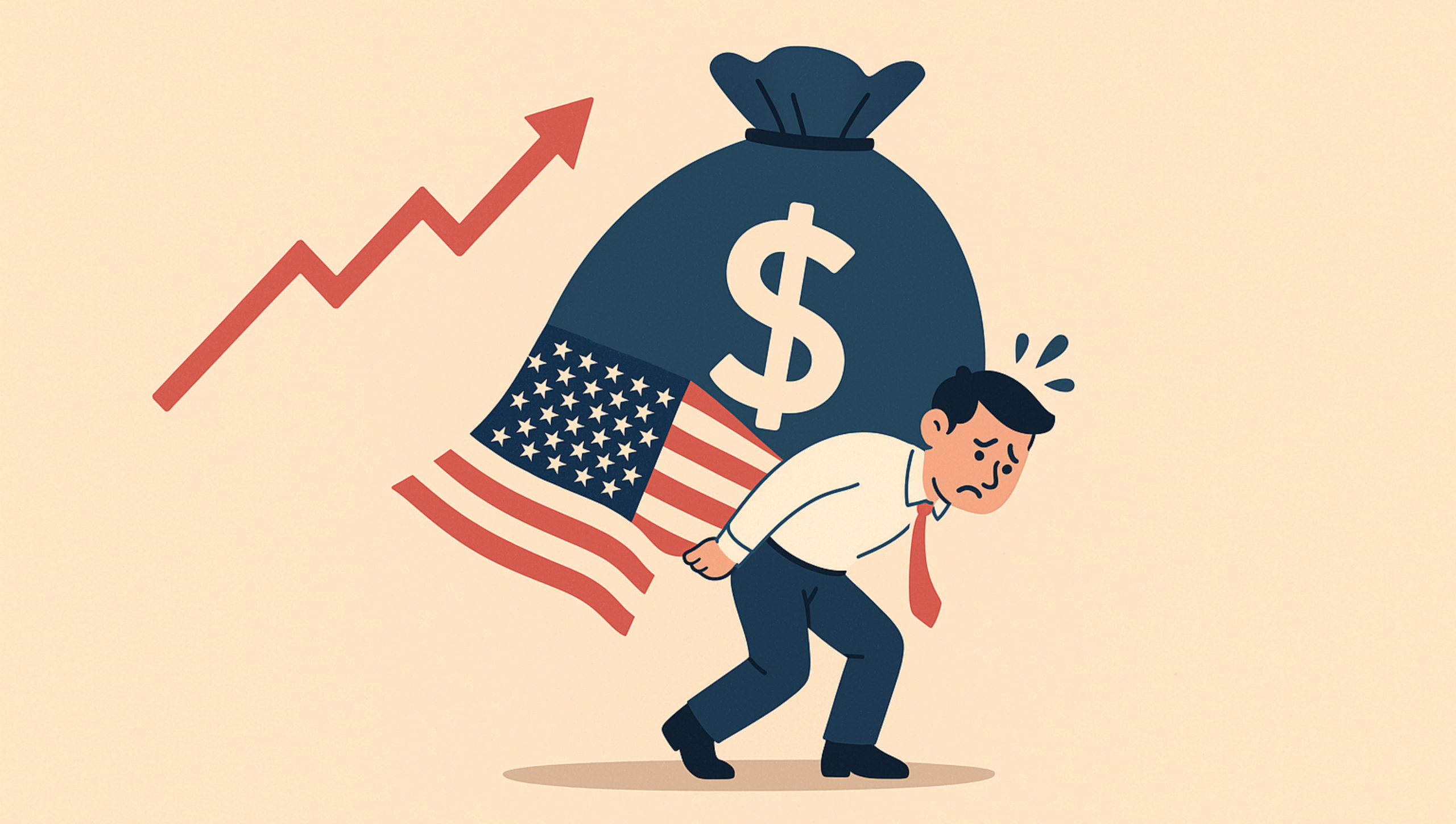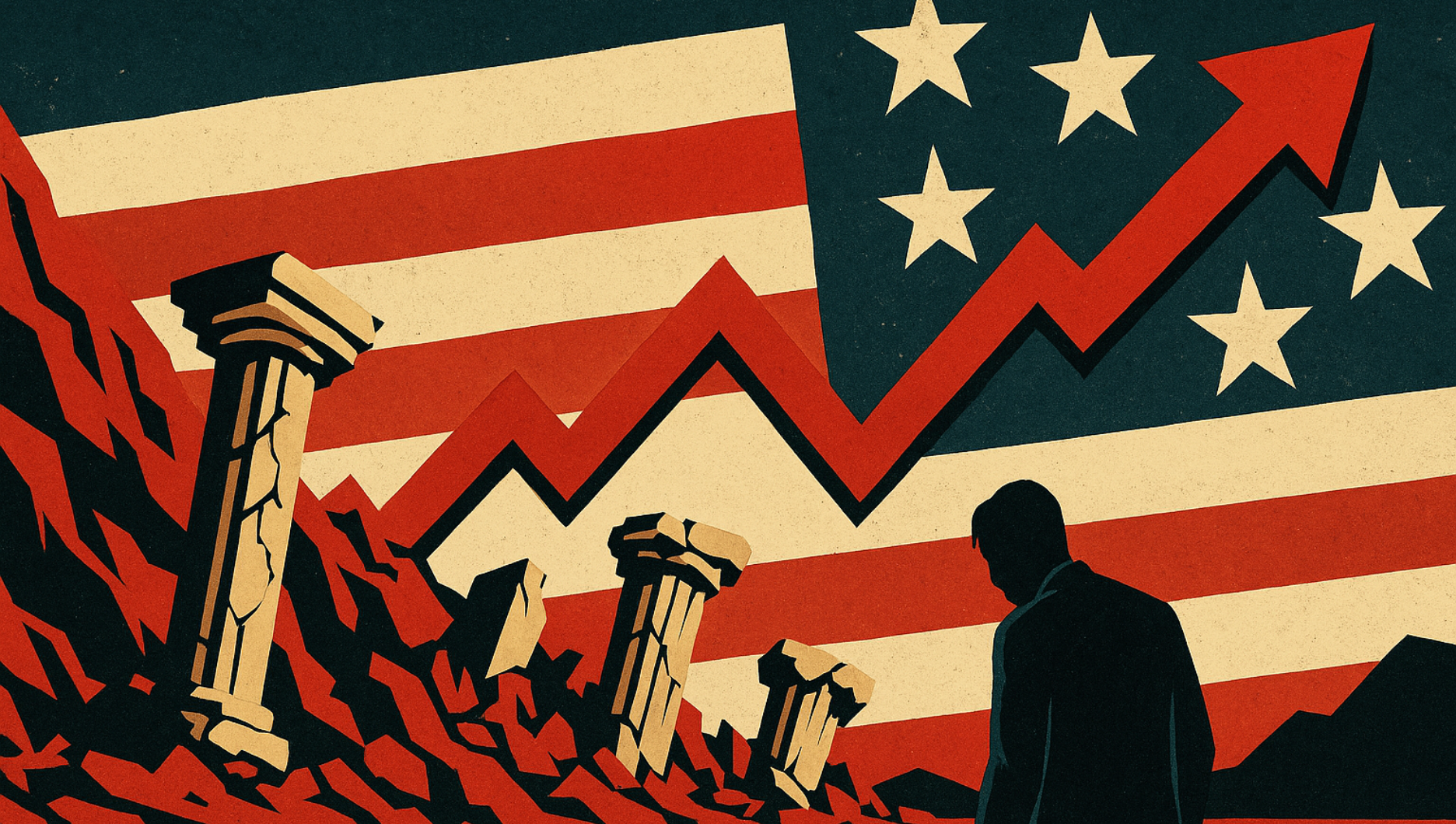Big Government Is Holding America Back
America’s federal debt has now skyrocketed past $35 trillion—an increase of $2.3 trillion in just the last fiscal year. Inflation persists, with core prices rising 3.3% over the past year. Meanwhile, government jobs are growing faster than private sector employment, which is draining the economy.
The warning signs are everywhere: big government stifles growth, and the solution is less intervention, not more.
Debt, Deficit, and Sluggish Growth: The Hidden Costs of Overspending
The U.S. is on an unsustainable fiscal path. A $2.3 trillion deficit and a debt-to-GDP ratio of about 125% are squeezing private investment essential for real, long-term economic growth. Instead, Keynesian-style interventions aimed at boosting demand through government spending have ballooned the national debt and undermined productivity.
Historically, government spending programs have delivered questionable short-term benefits but have left long-term economic consequences. The more the government grows, the more it crowds out the private sector’s ability to innovate and create high-quality jobs. This economic distortion is only deepening as Washington pours more money into inefficient programs while ignoring the importance of fiscal responsibility.
Inflation: The Persistent Threat to Household Budgets
September’s Consumer Price Index (CPI) showed a 2.4% overall increase, with core inflation excluding food and energy at 3.3%. While inflation has cooled from its 2022 peak, these numbers are still too high. American households feel the squeeze as the cost of essentials like shelter and services continues to rise, undermining real wage growth. Average weekly earnings adjusted for inflation have been down 3.4% since Biden-Harris took office in January 2021. It is no wonder that nearly 60% of Americans believe we are in a recession.
The Federal Reserve’s monetary excess continues to cause inflation. Between 2020 and 2021, the money supply expanded by over 40%, sparking inflation. The federal government’s continued spending spree makes it difficult for the Fed to drain its bloated $7 trillion balance sheet, so inflation will be around much longer than otherwise. This is because the Fed chooses to not let interest rates rise to fund the increased national debt, so it prints more money and disrupts economic activity, contributing to the fragile economy we have today.
Labor Market Distortion: Government Outpacing the Private Sector
On the surface, the U.S. labor market appears strong. The economy added 254,000 jobs in September, with private-sector employment increasing by 223,000. However, government jobs grew by 31,000, continuing a troubling trend that has persisted since April 2023. Government employment has been rising faster than private-sector jobs, shifting the labor market toward less productive sectors. This growth of government payrolls is not just unsustainable—it’s a drag on economic dynamism.
Private sector jobs are the engine of innovation and prosperity, but when the government grows at the expense of the private sector, it hampers job quality and wage growth. Real average hourly earnings remain below pre-pandemic levels, leaving workers with less purchasing power despite more jobs. Expanding government employment also means higher costs for taxpayers and more resources diverted from productive economic activity.
Texas: A Model of Free-Market Success
Texas exemplifies how free-market policies can lead to robust economic growth. The state’s low taxes, minimal regulation, and pro-business environment have consistently helped it outperform national job creation and economic growth averages. However, even Texas is not immune to the negative impacts of federal policy and its big-government, Keynesian creep. The crowding-out effect of federal debt growth and regulatory burdens imposed by Washington are raising costs for businesses and consumers alike.
To maintain its competitive edge, Texas must continue pushing for property tax elimination and spending limits at the state and local levels with a maximum of population growth plus inflation, but with excessive spending in recent years, there’s more evidence to at least freeze these budgets if not cut them by 10% or more. Phasing out school district M&O property taxes by state surpluses is essential for sustainable fiscal management and long-term growth. By keeping the government in check, Texas can remain a national leader in economic freedom.
Free-Market Capitalism: The Path Forward
The solution to America’s economic woes is clear: embrace free-market capitalism and reduce the size of government. Policymakers should focus on:
- Cutting Government Spending: Reducing spending will help control inflation, lower deficits, and allow the private sector to flourish.
- Reforming Taxes: Cutting taxes on individuals and businesses will increase disposable income, encourage investment, and support more job creation.
- Deregulating the Economy: Removing burdensome regulations will reduce business costs, spur innovation, and create high-paying jobs.
- Ending Monetary Excesses: A disciplined approach to monetary policy is essential to restoring confidence in the dollar and curbing inflation.
Milton Friedman once said, “The only way that has ever been discovered to have a lot of people cooperate voluntarily is through the free market.” This wisdom remains true today. America’s best chance for renewed prosperity is shifting from big-government Keynesianism toward free-market capitalism with strict fiscal and monetary rules and massive deregulation.
Texans for Fiscal Responsibility relies on the support of private donors across the Lone Star State in order to promote fiscal responsibility and pro-taxpayer government in Texas. Please consider supporting our efforts! Thank you!
Get The Fiscal Note, our free weekly roll-up on all the current events that could impact your wallet. Subscribe today!




